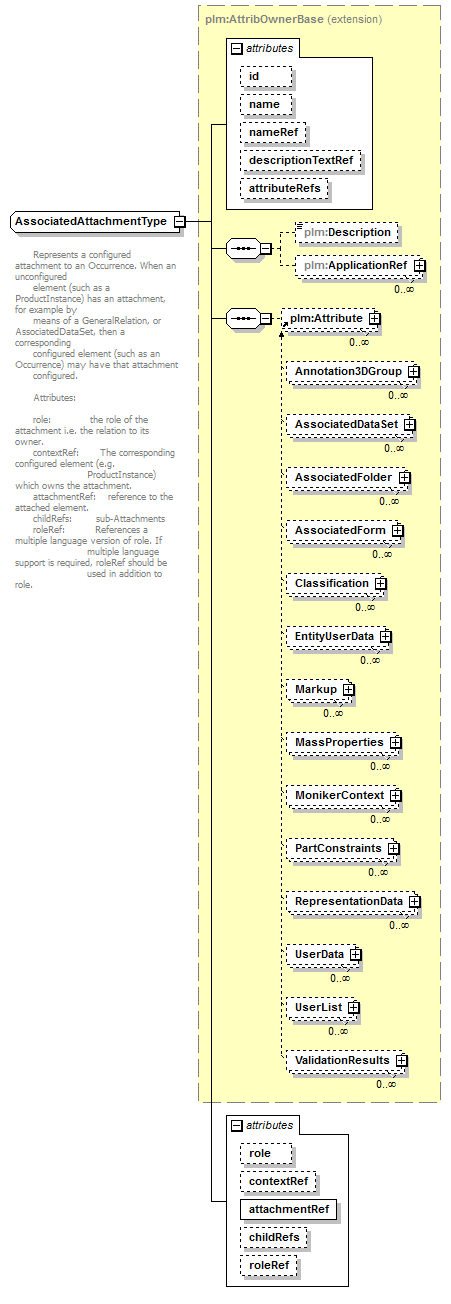| diagram |  |
||||||||||||||||||||||||||||||||||||||||||||||||||||||||||||||||||
| namespace | http://www.plmxml.org/Schemas/PLMXMLSchema | ||||||||||||||||||||||||||||||||||||||||||||||||||||||||||||||||||
| type | extension of plm:AttribOwnerBase | ||||||||||||||||||||||||||||||||||||||||||||||||||||||||||||||||||
| properties |
|
||||||||||||||||||||||||||||||||||||||||||||||||||||||||||||||||||
| children | plm:Description plm:ApplicationRef plm:Attribute | ||||||||||||||||||||||||||||||||||||||||||||||||||||||||||||||||||
| used by |
|
||||||||||||||||||||||||||||||||||||||||||||||||||||||||||||||||||
| attributes |
|
||||||||||||||||||||||||||||||||||||||||||||||||||||||||||||||||||
| annotation |
|
||||||||||||||||||||||||||||||||||||||||||||||||||||||||||||||||||
| source | <xsd:complexType name="AssociatedAttachmentType"> <xsd:annotation> <xsd:documentation> Represents a configured attachment to an Occurrence. When an unconfigured element (such as a ProductInstance) has an attachment, for example by means of a GeneralRelation, or AssociatedDataSet, then a corresponding configured element (such as an Occurrence) may have that attachment configured. Attributes: role: the role of the attachment i.e. the relation to its owner. contextRef: The corresponding configured element (e.g. ProductInstance) which owns the attachment. attachmentRef: reference to the attached element. childRefs: sub-Attachments roleRef: References a multiple language version of role. If multiple language support is required, roleRef should be used in addition to role. </xsd:documentation> </xsd:annotation> <xsd:complexContent> <xsd:extension base="plm:AttribOwnerBase"> <xsd:attribute name="role" type="xsd:string"/> <xsd:attribute name="contextRef" type="plm:anyURIType"/> <xsd:attribute name="attachmentRef" type="plm:anyURIType" use="required"/> <xsd:attribute name="childRefs" type="plm:uriReferenceListType" plm:refType="plm:AssociatedAttachment"/> <xsd:attribute name="roleRef" type="plm:anyURIType" use="optional" plm:refType="plm:Text"/> </xsd:extension> </xsd:complexContent> </xsd:complexType> |
attribute AssociatedAttachmentType/@role
| type | xsd:string |
| source | <xsd:attribute name="role" type="xsd:string"/> |
attribute AssociatedAttachmentType/@contextRef
| type | plm:anyURIType |
| source | <xsd:attribute name="contextRef" type="plm:anyURIType"/> |
attribute AssociatedAttachmentType/@attachmentRef
| type | plm:anyURIType | ||
| properties |
|
||
| source | <xsd:attribute name="attachmentRef" type="plm:anyURIType" use="required"/> |
attribute AssociatedAttachmentType/@childRefs
| type | plm:uriReferenceListType |
| source | <xsd:attribute name="childRefs" type="plm:uriReferenceListType" plm:refType="plm:AssociatedAttachment"/> |
attribute AssociatedAttachmentType/@roleRef
| type | plm:anyURIType | ||
| properties |
|
||
| source | <xsd:attribute name="roleRef" type="plm:anyURIType" use="optional" plm:refType="plm:Text"/> |
XML Schema documentation generated by XMLSpy Schema Editor http://www.altova.com/xmlspy